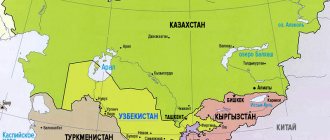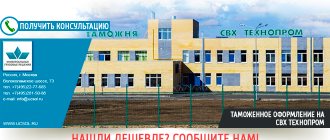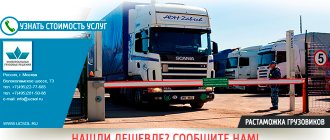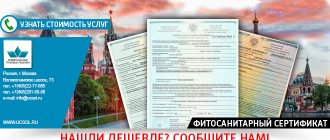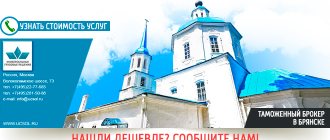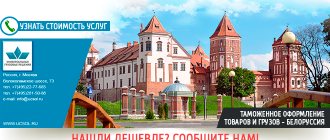Sudan is a country in East Africa with an underdeveloped economy, weakened by numerous political conflicts. But the country’s leadership is trying to correct the situation, which has a positive effect on the growth rate of trade turnover. Most of the population is employed in the agricultural sector and construction; there are several deposits of precious metals and ore, but there are not enough qualified personnel for their development and extraction.
Trade and economic relations between Russia and Sudan are regulated by an agreement that was signed in 1998. It concerns trade, economic and technical cooperation. The key interest for Russia is the arms and energy market in Sudan.
ATTENTION! We work only with legal entities.
Customs and customs formalities
Customs is a state body that, in accordance with current legislation, controls the passage of all kinds of cargo, postal items, luggage, jewelry and cash, as well as passengers, across the state border. Customs also collects established duties and other fees.
Customs formalities are considered to be procedures directly related to verifying compliance by persons crossing the state border with the conditions and rules for the export and import of various goods, items and currency. Compliance with all of the above formalities is under the control of the customs service at the border of each specific country.
All customs formalities are directly related not only to the implementation of customs rules established in a particular state, but also to the payment by tourists of various charges, fees, duties and taxes.
Export Features
Food products, agricultural raw materials, machinery, equipment and chemical products are exported from Russia to Sudan.
A new exporter may encounter problems when returning VAT and collecting documentation. Some products require a certificate of origin and an expert opinion.
If you want to save yourself from such problems, then you should trust the reliable and professional team of SB Cargo. We will represent your interests as a customs broker. If you encounter difficulties filling out documentation and preparing an export transaction, please contact our company. We will promptly answer all your questions and solve logistics problems of any complexity.
Customs declaration
A customs declaration is a written statement provided by a citizen to the customs service when crossing the border. Goods and things that this citizen wishes to export or import are subject to declaration.
All persons over 16 years of age must fill out a customs declaration. If entry into the country is temporary, then the customs declaration, certified by a customs officer, remains in the hands of the citizen. This declaration should be kept carefully, as if lost it cannot be restored.
All items transported by citizens can be checked by customs officers at any time. A special tax is imposed on all baggage carried in excess of the norm established by the relevant rules.
Import Features
Sudan mainly supplies gold, seeds, natural shellac and peanuts to Russian territory. For customs clearance of goods from Sudan, you need to correctly collect all the necessary documents.
Customs documents must not contain errors, corrections, inaccuracies or discrepancies with the actual volume of goods.
There are many nuances in customs clearance that are difficult to understand. Our staff will help you take into account all the details of this procedure and promptly prepare the entire package of documents. This simplifies and speeds up customs inspection.
Basic documents required to cross the border:
- invoice;
- foreign trade contract;
- packing list;
- permitting documentation;
- waybill.
The full list of documents depends on the category of cargo being transported:
- Food industry products must comply with TR CU (Technical Regulations of the Customs Union) “On the safety of food products.”
- Requirements for other goods are also set out in various TR CU;
- There are categories of goods that need to be certified.
- For children's products, cosmetics, and dietary supplements, a state registration certificate is required.
- Products of plant origin must be accompanied by a phytosanitary certificate, and products of animal origin must be accompanied by a veterinary certificate.
- Some types of clothing must be marked - KIZ (control and measuring mark).
Basic customs formalities
Almost all countries have a general procedure according to which goods for personal use imported and exported by travelers are exempt from customs duties and payments. However, sometimes a tourist may be required to provide appropriate explanations, as well as evidence that he is carrying certain things specifically for his personal use.
At the same time, the concept “in reasonable quantities” is applied to personal items transported across the borders of different countries. For example, a video camera or a laptop in one copy can indeed be transported for personal use, but two video cameras or three laptops will already arouse suspicion.
Customs clearance
provides services for customs clearance of imported cargo from Sudan to Russia and back. We are a licensed customs representative. We will take care of all customs formalities at checkpoints.
Trade relations with Sudan have many nuances:
- there are bans or restrictions on the import of certain categories of goods;
- Some cargo has weight limits;
- it is important to select the HS code correctly;
- In addition to the main package of documents, you need to take care of all permits.
This is not the entire list of possible difficulties that you may encounter. It is better to seek preliminary consultation from our company to avoid financial problems in the future.
Personal items
In addition to toiletries, clothing and a number of other items of a clearly personal nature, in accordance with Standard number 30 of Annex F. 3 to the Kyoto Convention, the following are considered personal effects:
- Movie and photographic cameras, along with a reasonable supply of various accessories.
- Personal jewelry.
- Wheelchairs.
- Binoculars.
- Mobile or cell phones.
- Portable film and slide projectors and a reasonable number of accessories.
- Sport equipment.
- Portable personal computers and related accessories.
- Portable musical instruments.
- Portable typewriters.
- Strollers and regular strollers.
- Portable TVs.
- Portable sound-reproducing devices (CD players, tape recorders and voice recorders, as well as records, tapes and discs).
- Portable calculators.
- Portable radios.
Nuances
When crossing the Russian border, all documents confirming the origin of the cargo, its characteristics and value must be submitted to the customs service.
The cleaning process takes place in several stages:
- Filling out a customs declaration is the primary procedure carried out by the owner of the cargo or his representative. Customs officers check the correctness of the entered data. The cargo is placed for temporary storage in a special warehouse and remains there until the inspection is completed.
- After declaration, all documents provided for the cargo are subject to careful verification. All product codes must be indicated correctly, and the package of documents must be complete and contain all necessary certificates, licenses, and permits. An advance payment to ensure payment of duties must be deposited into the declarant’s single personal account before submitting the declaration.
- Tax fees and duties are calculated and written off from the advance amount. Their value depends on the tariffs at the time of the operation. If there is no advance payment, further customs clearance is impossible. If there are insufficient funds to pay the fees, the release will be refused. You will have to submit a declaration for the goods again, paying the customs clearance fee again (not to be confused with customs duties).
After checking the documentation and obtaining permission from customs, the goods are ready for legal transportation.
In relation to the countries of the Eurasian Economic Union (EAEU), which, along with Russia, includes Kyrgyzstan, Belarus, Kazakhstan and Armenia, simplified customs rules apply. Mutual trade provides for exemption from duties and other benefits.
What is always prohibited to export and import
In all cases, movement across the border is prohibited:
- Weapons of all types (including cold weapons).
- Antiques.
- Poisons and other dangerous substances.
- All groups of narcotic substances (even if they are transported in the form of medicines).
- Rough gemstones and metals.
- Products with pornographic content.
In addition to this main list, each country may have various additions to it, so you should check these formalities before traveling.
Features of cargo transportation from Sudan to Russia and back
Due to Sudan's location, goods from there can only be transported by sea and air. Road and rail transport can only be used as one stage of a multimodal scheme.
The sea route is suitable for non-perishable goods (cereals, leather, metals). Loading into the container is carried out at the seaport of Port Sudan. From there, the cargo travels through the Red Sea through the Suez Canal, then through the Mediterranean and Black Seas to the port of Novorossiysk. There is an option to pass through the Strait of Gibraltar for transportation to northern ports.
Air delivery is an expensive method of transporting goods, suitable for valuable goods and products with a short shelf life. Departure is carried out from Khartoum airport to one of the international Russian airports (Pulkovo, Domodedovo, Vnukovo, Sheremetyevo, Koltsovo)
International delivery sometimes requires the use of several modes of transport at once. This is multimodal or combined delivery. The staff will competently plan a mixed route. This will allow you to find the optimal balance between travel time and financial costs of transportation.
Delivery terms:
- air delivery – 2-4 days;
- transportation by sea – 15-25 days;
- multimodal transportation through Moscow or St. Petersburg to one of the regional centers – 35-45 days.
Possible difficulties
The most important problem is considered to be the colossal difference in permits from different countries for duty-free export and import of certain goods and things. Often, something that was legally allowed through by customs officers in the country of departure may turn out to be prohibited for import by customs in the host country.
Moreover, customs formalities may change periodically, so before making a trip you should definitely check them either with the tour operator or on the website of the Ministry of Foreign Affairs of your country. This will help avoid all sorts of misunderstandings.
Categories and types of imported and exported goods
Russia transports the following categories of cargo to Sudan:
- food products and agricultural raw materials (HS codes 01-24) – 90.86%;
- machinery, equipment and vehicles (HS codes 84-90) – 2.7%;
- wood and paper and cellulose products (HS codes 44-49) – 1.7%;
- metals and products made from them (HS codes 72-83) – 1.52%;
- mineral resources (HS codes 25-27) – 1.09%;
- chemicals (HS codes 28-40) – 0.27%.
In 2021, there has been an increase in exports of cereals, fats and oils of animal or vegetable origin, tools, electrical machines and equipment, and optical instruments. Exports of pharmaceuticals, printed matter, nuclear reactors, aluminum and hats declined.
The bulk of cargo that arrives in Russia from Sudan belongs to the following groups:
- food products and agricultural raw materials (HS codes 01-24) – 95.64%;
- machinery, equipment and vehicles (HS codes 84-90) – 4.32%;
- metals and products made from them (HS codes 72-83) – 0.04%.
The import of natural shellac, nuclear reactors, glass, instruments, optical instruments, plastics, electrical machines and equipment has decreased.
Declaration procedure
Declaration of goods is carried out by submitting an application exclusively in writing with the seal of the representative office and the signature of an authorized person. This is the so-called simplified procedure. It should contain the following information:
- name of the customs authority;
- name and address of the sender;
- name and address of the recipient;
- identification number of the transport document and the date of its issue;
- name of the product indicating quantitative characteristics and cost.
The application must be accompanied by commercial and transport documents, a document indicating the status of the person or a power of attorney from the organization, certified by a seal.
Rules governing customs clearance of diplomatic cargo
- Vienna Convention on Diplomatic Relations of 1961;
- Vienna Convention on Consular Relations of 1963;
- Vienna Convention on the Representation of States in their Relations with International Organizations of a Universal Character (1975);
- Customs Code of the Customs Union;
- Russian legislation, etc.
The scope of privileges and immunities is established by the Customs Code and international treaties. Moreover, the effect of international treaties is primary if they contain a greater volume of privileges and immunities than in the Customs Code.
What cargo is considered diplomatic?
The movement of diplomats and diplomatic cargo across the customs border requires a specific procedure for customs clearance. Special rules, prohibitions and restrictions apply regarding:
- cargoes that are intended for the official use of diplomatic missions, consular offices and other representative offices in the customs territory of the Union;
- cargo of parliamentary, government and official delegations;
- personal belongings owned by persons having immunity or privileges in accordance with international treaties;
- personal belongings of employees and officials of international organizations and representative offices;
- personal belongings of family members of the above persons.
ATTENTION!
We work only with legal entities. There is no consensus on which family members of diplomats are covered by diplomatic immunities. The family definitely includes the spouse, minor children and usually the diplomat's dependents. They receive a diplomatic card.
